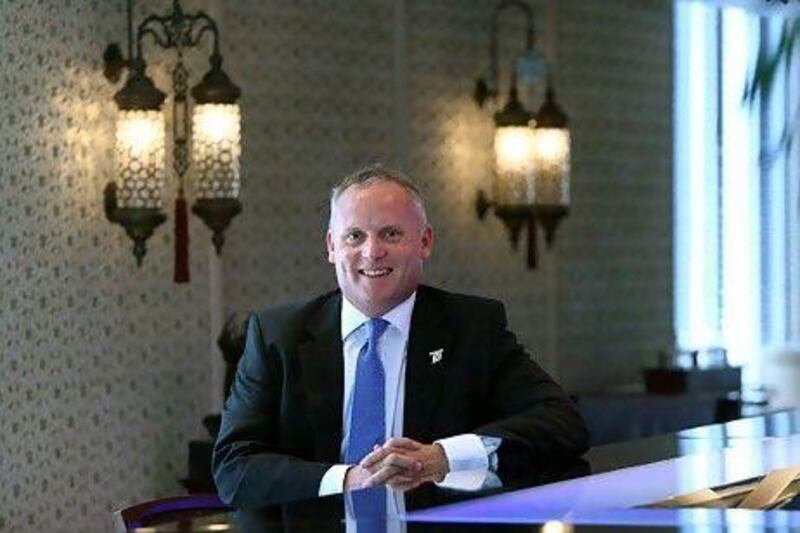How do you sell a low-tax offshore financial centre to investors in a zero-tax offshore financial centre?
That is the job Sean Costello has been tasked with for the past 18 months, and by all accounts he has made a pretty good job of this apparently tough assignment.
Mr Costello is the chief representative officer of the organisation Jersey Financefor the GCC states and India. His role is to drum up business in the region and direct it towards Jersey, one of the Channel Islands lying off the coast of northern France in the English Channel.
Jersey has a decades-old reputation as a centre for offshore financial innovation, with low personal income tax and tax-efficient instruments that make it a haven for many wealthy investors.
"It's true that most countries in the GCC have no income tax at all, but Jersey has 50 years' experience in financial services and a sophisticated industry," he says. "It was recently classed the number one offshore centre in the world by the Global Financial Services Index.
"So wealthy Arabs and Indians want to use Jersey structures, for example, to buy property in Britain or elsewhere in Europe, or to pay for their children's education in English schools, or for financial planning."
He reels out the figures that demonstrate how successful he has been: in the past five years the amount deposited by GCC investors in Jersey has doubled, and now stands at £21.2 billion (Dh122.11bn), or 14 per cent of total deposits on the island.
"Jersey is competitive on costs, transparent on information and cooperative. It is also highly regulated. These are all qualities Arabian Gulf investors value," says Mr Costello.
Most of the deposits come from the UAE, which appears to justify the decision by Jersey to focus its operations in the region in Abu Dhabi when they wanted to hire a representative. Mr Costello, after stints at accounting firms PricewaterhouseCoopers and Deloitte, saw a newspaper advertisement (in The National) and got the job. "My parents lived on the island for a while, but I had no other connections with it," he says. He is an Irish citizen; his father came from County Limerick.
"I saw Abu Dhabi as the strategic hub of the region. There were other centres, like Doha and of course Dubai, but Abu Dhabi had wealth and was the capital, so those were the factors," he says.
His time in the capital has led to a surge of interest by local financial institutions in Jersey. Abu Dhabi Commercial Bank opened a branch there last November (managed for ADCB by Allied Irish Banks, which was paring back its foreign businesses after the Irish financial crisis).
HSBC Middle East, the oldest bank in the UAE, is regulated by the Jersey financial authority.
National Bank of Abu Dhabi and Emirates NBD also use Jersey trusts for wealth planning, and, after several visits to the capital by Jersey officials, a memorandum of understanding (MOU) with the UAE Central Bank was signed last year.
Another MOU has also been penned with the Dubai Financial Services Authority, and discussions are also under way with Dubai International Financial Centre.
But just as it all seems to be going so well for the Jersey-GCC relationship, a cloud has appeared on the horizon. The island got dragged into the increasingly shrill debate going on in the United Kingdom about tax, and the moral difference between tax evasion (a crime under British law) and tax avoidance (a legal and understandable matter).
It was even suggested in Jersey that the island might break its centuries-old link with the UK to protect its right to offer tax-minimising schemes to British and other citizens.
Mr Costello does not want to get drawn into the arguments when there is a constitutional review under way in Jersey, but he does say: "There have been good relations between Jersey and London for 800 years, and on balance we are extremely proud of that."
There are more immediate challenges in the Middle East. His remit covers India as well as the Arabian Gulf, which he admits if "almost too big", and makes regular trips to Mumbai and Delhi each month, focusing on individuals with net worth in the £2 million to £5m range. "It's a big nascent market, and fits in well with the work in the UAE, when you consider the links between India and the Gulf."
The big regional prize remains Saudi Arabia. "It is still underdeveloped and closed to some degree, but when something like the King Abdullah Financial District gets fully under way it will dwarf all the others," he believes.
But the UAE will remain the hub of Jersey's financial push in the region. "Members of the Abu Dhabi Royal Family have used Jersey for years, and remain Anglophile. I've just presented a picture of Queen Elizabeth II to them as part of the Golden Jubilee celebrations this year."
"And," he points out with obvious glee, "the Ruler of Fujairah keeps Jersey cattle".
twitter: Follow and share our breaking business news. Follow us
iPad users can follow our twitterfeed via Flipboard - just search for Ind_Insights on the app.





